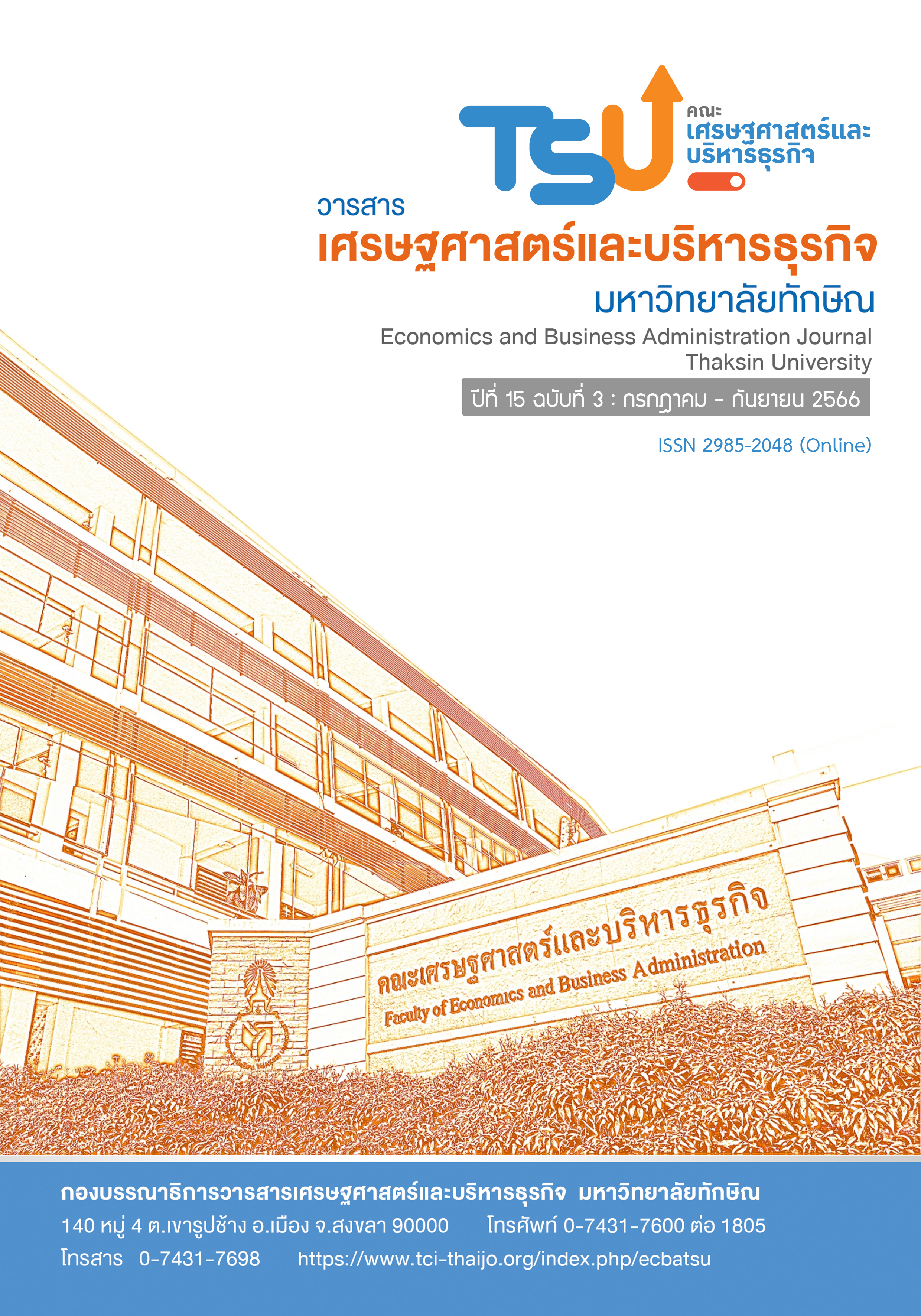The Impact of Waste and Relevant Factors on Economic Prosperity in Nonthaburi Province
DOI:
https://doi.org/10.55164/ecbajournal.v15i3.259881Keywords:
Economic growth, Time Series, WasteAbstract
This research aims to study the impact of waste and relevant factors on economic prosperity in Nonthaburi province by using annual time-series data for 15 years (2006-2020). The effects of independent variables on dependent variables were determined by the coefficients in the equation estimated by using Ordinary Least Squares method (OLS) in multiple regression analysis. The result identified that an increased amount of waste correspondingly signified economic growth, whereas an increase in the consumption tax rate would deteriorate the growth in Nonthaburi province.
References
Bhalotra, S. R. (2001). The Puzzle of Jobless Growth in Indian Manufacturing. Oxford Bullentin of Economics and Statistics, 60(1), 5-32.
Boonpienpon, N. (2017). “Eco Restaurant” An Approach to Wise and Environmentfriendly Business Operation. Valaya Alongkorn Review (Humanities and Social Science), 7(2), 131-141
Central region office. (2022). Provincial Group Development Plan (2019-2022) Review edition of the Central Region Provincial Group. http://centralnpt.com/Content/pdf/plan65.pdf
Chaithat, C. (2006). An Analysis of the Government Budgetary Expenditure on the Regional Economic Growth in Thailand [Master’s thesis]. Sukhothai Thammathirat Open University.
Chanagul, C. (2018). Tax and Econimic Growth In Thailand. MFU Connexion: Journal of Humanities and Social Sciences, 7(2), 174–197.
Chunhachoti-ananta, S., & Onin, T. (2017). A Complete Report on the Project to Explore the Status of the Sustainable Development Goals in the Thai Context and Alternative Economic, Social and Legal Measures, Goal 12. https://sdgmove.files.wordpress.com/2017/04/final-report-sdgs-goal-12.pdf
Eamkeaw, S. (2008). Analysis of Economic Growth In Thailand [Master’s thesis]. https://dric.nrct.go.th/index.php?/Search/SearchDetail/220018
Faculty of Economics Thammasat University, Centre for SDG Research and Support : SDG Move. (2021). https://www.sdgmove.com/aboutsdgs/
Meechai, P. (2011). An Analysis of Public Investment Spending on Economic Growth [Master’s thesis].
https://www.nesdc.go.th/ewt_news.php?nid=6420&filename=develop_issue
Nonthaburi Provincial Office. (2021). Nonthaburi Province 5-Year Development Plan 2018-2022 (Review Edition) Year 2022. http://nonthaburi.go.th/64083.html
Office of the National Economic and Social Development Council. (2021). Statistical Data of Demographic Data Population and Housing in the Country. http://statbbi.nso.go.th/staticreport/page/sector/th/01.aspx
Office of the National Economic and Social Development Council. (2021). Statistical Data of Gross Domestic Product. http://ittdashboard.nso.go.th/preview.php?id_project=75
Office of the National Economic and Social Development Council. (2021). Statistical Data of Natural Resources and Environment. http://statbbi.nso.go.th/staticreport/page/sector/th/21.aspx
Parliamentary Budget office, The Secretariat of The House of Representatines. (2021). Annual Budget Expenditure Analysis Report 2021. https://www.parliament.go.th/ewtadmin/ewt/parbudget/ewt_news.php?nid=919
Pholpanich, P., & Kunnoot, S. (2018). Physical Capital, Human Capital, Natural Capital, Social Capital and Economic Growth. NIDA Development Journal, 58(3), 154-168.
Pornputapong, T. (2015). The Relationship between Economic Growthand Global Warming in Thailand based on the Environmental Kuznets Curve Hypothesis. Romphruek Journal Krirk Uninversity, 31(2), 99-116.
Provincial Labour Office Nonthaburi. (2021). Labor Situation Report Nonthaburi Province, Q4 of the Year 2020. https://nonthaburi.mol.go.th/news_group/labour_situation
Phonvichai, T., & Khuntaweetep, W. (2014). Government Expenditure: A Driving Force in the Thai Economy?. University of Thai Chamber of Commerce Journal, 34(4), 161-176.
Ratchatisan, N., & Leelaprasertsil, W. (2021). Factors that Determine the Economic Growth of Thailand in the 2nd National and International Conference on Humanities and Social Sciences (TSU-HUSOiCon 2021) : The Role, Importance and Challenges of Humanities and Social Sciences in the Disruptive Society (July 9-10, 2021), 129-136). The Bed Vacation Rajamangala Hotel, Songkhla, Thailand.
Sanjose. (2020). Growth Factors of Waste Management Equipment market size (Report 2019-2027): Growing CAGR 4.0%. Retrieved from https://apnews.com/press-release/wired-release/business-middle-east-africa-environment-waste-management-a77473d994eddff52cbaa59287458efd
Seguino, S. (2007). Gender wage inequality and export‐led growth in South Korea. Journal of Development Studies, 34(2), 102-132.
Silapawitayatorn, P. (2009). The Relationship between Infrastructure and Economic Growth In Thailand [Master’s thesis]. Kasetsart University.
Stevens, J. (1992). Applied Multivariate Statistics for the Social Sciences. (2nd ed.). Mahwah, NJ: Lawrence Erlbaum Associates.
Thongsawat, S., Chancharat, Surachai., & Sooksakol, K. (2016). Carbon Dioxide Emissions and Economic Growth: Evidence from ASEAN Countries. Suranaree Journal of Science and Technology, 10(1), 1-20.
Tunyut, W. (2015). Environmental Kuznets Curve and GDP Sector Composition. Thammasat University.
Wongsawas, S. (2016). Factors affecting money supply in Thailand. Journal of Thonburi University, 10(22), 89–98.
Downloads
Published
How to Cite
Issue
Section
License
Copyright (c) 2023 Economics and Business Administration Journal Thaksin University

This work is licensed under a Creative Commons Attribution-NonCommercial-NoDerivatives 4.0 International License.




